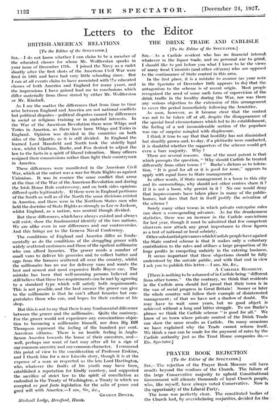THE DRINK TRADE AND CARLISLE • [To the Editor of
the SPECTATOR.] • a Carlisle resident who has iio financial interest whatever in the liquor trade, and no personal axe to grind, I should like to put before you what I know to be the views of many local Unionists (and other citizens) who are opposed to the continuance of State control in this area.
In the first place, it is a mistake to assume (as your note in the Spectator of December 10th appears to do} that the antagonism to the scheme is of recent origin. Most people recognized the need of some such form of supervision of the drink traffic in the locality during the War, nor was there any serious objection to the extension of this arrangement to cover the period immediately following the Armistice.
As soon, however, as it became clear that the control was not to be taken off at all, despite the disappearance of the special local circumstances which led to its establishment; the feeling of a not inconsiderable section Of the populace was one of surprise mingled with displeasure.
I think it true to say that that hostility has not diminished but steadily grown and, to-day, if a plebiscite were conducted, it is doubtful whether the supporters of the scheme would get even a bare majority. 'Why?
There are several reasons. One of the most potent is that which prompts the question, "Why should Carlisle be treated differently from other towns ? " Burke's dictum as to tolera- tion, "It is good for all or it is good for none," appears to apply with equal force to State management.
In other words, if State management is a boon to this city and its surroundings, why should not other centres share it ? If it is not a boon, why persist in it ? No one would deny that improvements have taken place in many of the public- houses, but does that fact in itself justify the retention of the scheme ?
Surely many other towns in which private enterprise rules can show a corresponding advance. As for the drunkenness statistics, there was an increase in the Carlisle convictions for last year, though it must be admitted that few competent observers now attach any great importance to these figures as a test of national or local sobriety.
Other substantial grievances which Carlisle people have against the State control scheme is that it makes only a voluntary. contribution to the rates and utilizes a large proportion of its huge profits in competing unfairly in the catering business. It seems important that these objections should be fully understood by the outside public, and with that end in view I ask you to publish this letter.—! am, Sir, &c., A CARLISLE RESIDENT.
[There is nothing to be ashamed of in Carlisle being "different from other towns." On the contrary, we think that residents in the Carlisle area should feel proud that their town is in the van of social progress in Great Britain! Seoner or later the whole country will follow their example of disinterested management ; of that we have not a shadow of doubt. We may have to wait some years, but no good object is achieved without a long and bitter struggle. To use Burke's phrase we think the Carlisle scheme "is good for all." We know of no town where 'private control of the Drink Trade can show the same results as Carlisle. On many occasions we have explained why the Trade- cannot reform itself. We think a ease can be made for the payment of rates by the Carlisle authority just as the_ Trust House companies do.— En. Spectator.]






























 Previous page
Previous page